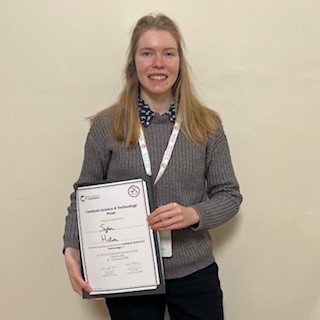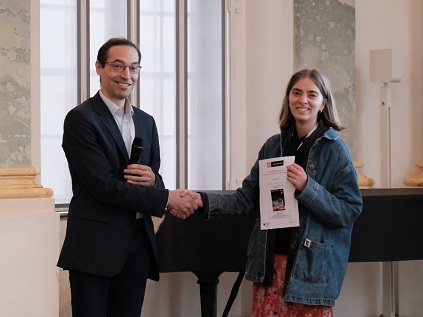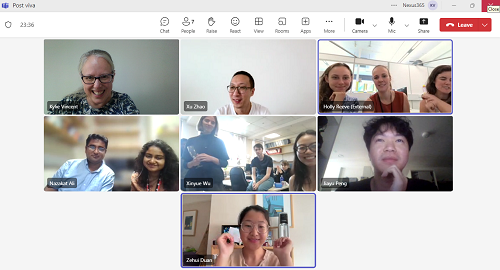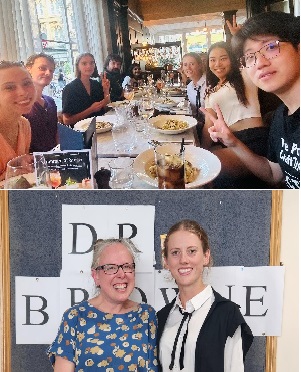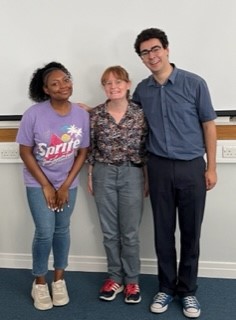
Department of Chemistry,
University of Oxford,
Inorganic Chemistry Laboratory,
South Parks Road, OX1 3QR
kylie.vincent@chem.ox.ac.uk
|
News Welcome to Natalia Dyachenko who joins us as a postdoc on the W-Biocat project in Feb 2025, and to Rob Schmitz who visited on this project in Feb. from TU Delft. Congratulations to Sofia Helin who won the RSC Catalysis Science and Technology poster prize at GIC-EFCATS 2025 PhD Winter School, with Shreya also attending this meeting.
Congratulations to Dr Charlotte Hancox who passed her DPhil in Jan 2025! Congratulations to Tara Lurshay, Maya Landis and Sam Lai who all submitted their theses in Jan/Feb 2025! Congratulations to Maya who won a poster prize at ECHEMS Conference 2024: Electrochemistry in Molecular Transformations (November 2024)!
Congratulations to Xu who passed his viva with minor corrections at the beginning of August!
Congratulations to Lucy who passed her viva with minor corrections at the end of July, and has already completed the corrections!
Welcome to Oska and Max who joined our nitro reduction research effort! Congratulations to Yu Sun who passed her viva with Minor Corrections on 4 July! Welcome to Oska who joined us as a postdoc with iCAST, as well as Natasza and Sam who join us as summer students in July. Well done to Lucy Browne, Yu Sun and Xu Zhao who all submitted their DPhil theses in May! Congratulations to our final year DPhil students, Jiayu Peng, Kin Long Wong and Zehui Duan who all presented at the Graduate Symposium in April The Vincent group are happy to host Aster from TU Delft for 2.5 weeks in February '24 to carry out some experiments with Jiayu Peng (Adam) We wish Kin Long Wong (Chris) all the best as he heads off to ANSTO in Feb '24 for neutron diffraction experiments. The Vincent group were delighted to host 3 undergraduate summer research students in summer '23: Nomagugu Moyo, Grace Elliott-Sherratt and Pedro Theodoro. Their projects have opened new directions in our research: thanks for all your hard work, and to the group for hosting so well.
Congratulations to Sofia who came second in the Dobson prize for research communication among MPLS students at Linacre College.
|
Our research is mainly in the areas of bioinorganic chemistry and chemical biology or industrial biotechnology. We are driven by the excitement of discovering fundamental mechanisms of catalysis in biology, and the possibilities for exploiting biocatalysis in new ways for chemical synthesis. The activation of small molecules in biology is a key research theme in the Vincent group. Chemists have a lot to learn from catalytic processes which occur in microorganisms. For example, nature has tuned hydrogenase enzymes to oxidise and produce H2 efficiently at earth-abundant iron or nickel-iron catalytic sites. Nitrogenase catalyses the fixation of N2 to ammonia under mild conditions. Carbon dioxide reducing enzymes fix CO2 selectively into CO or formate. These chemical reactions represent some of the greatest chemical challenges for solving the world's energy problems, and we hope that what we learn from studying the biocatalytic reactions will inspire development of new catalysts for energy technologies. The Vincent group has developed a suite of spectroscopic techniques that bridge gaps between measurements of enzyme activity, spectroscopy and structure. With significant funding from the BBSRC and the European Research Council (ERC) we are employing these to great effect in probing the mechanisms of metalloenzymes involved biological hydrogen, carbon and nitrogen cycles. In parallel we are excited by the interface between academic discovery and technology innovation. We have developed and patented a H2-driven approach to heterogeneous biocatalysis, known as the HydRegen system. This bridges the advantages of clean, metal-driven hydrogenations and selective biocatalysis under mild conditions. By immobilising all the enzymes for a desired C=X bond reduction on a carbon support, we enable heterogeneous biocatalytic hydrogenations which can be readily translated into continuous flow processes. We have extended this to biocatalytic deuterium insertion, to H2-driven flavin recycling, to continuous flow reactors and to chemo-bio catalytic cascades. With significant funding from Innovate UK, EPSRC and BBSRC, and close industrial collaborations, we are taking some of these areas forward to commercialisation. The company HydRegen was spun out from the University of Oxford in 2021 with former group member, Dr Holly Reeve, as CEO. Within the Vincent group, we continue to innovate in the biocatalysis area. |
Opportunities in the Vincent Group
We are a friendly, sociable research group, and we really value our diverse membership. We celebrate the mix of cultures represented in the group, and the creative-thinking that comes from a neuro-diverse, gender-balanced and LGBTQ+ -inclusive team. We value innovation and a 'can-do' attitude towards solving challenges in research. Please do get in touch if you would like to hear more about opportunuities in the Vincent group. We always welcome applications from qualified students or postdoctoral scientists with scholarships or fellowships to support their research, or candidates seeking to apply for Oxford scholarships or fellowships. As a group we span a broad range of subject expertise: from bio-inorganic or bio-physical chemistry to synthetic organic chemistry to structural and molecular biology. In 2025/6 we expect to take 3 Oxford MChem students. |
